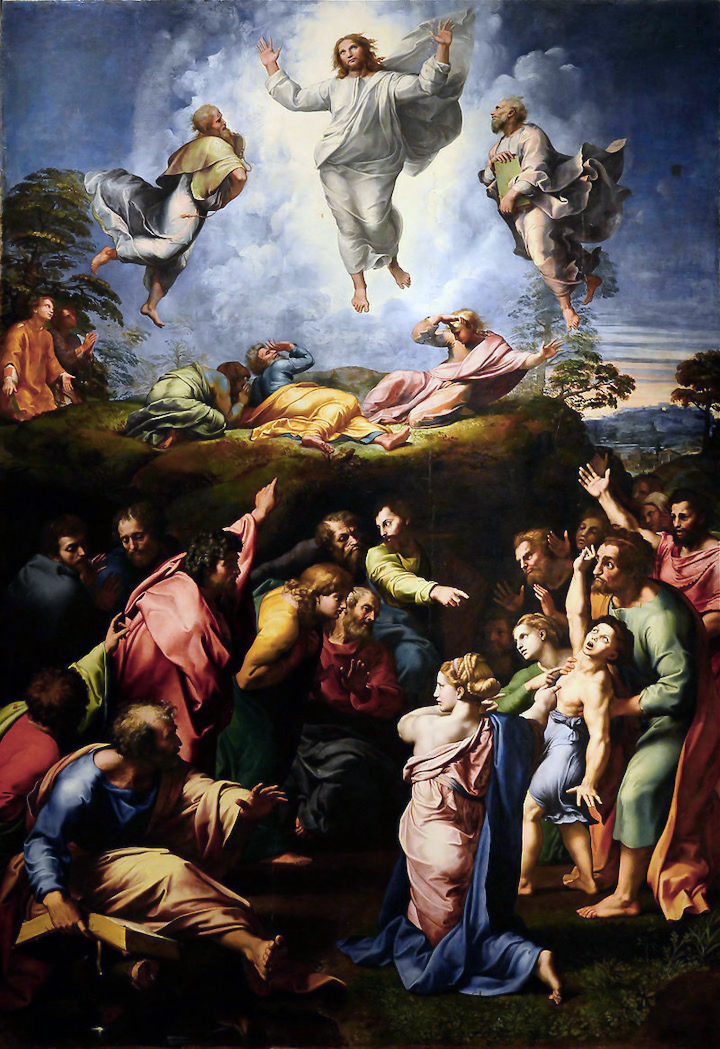The Church of Christ is holy. And an essential part of holiness is to be set apart. Of course, this separateness can be misconstrued and lead to a “ghetto” mentality – an isolationism and unhealthy self-focus. Nevertheless, that abuse doesn’t eliminate the use. Or the truth. Saint Peter proclaims, “you are a chosen race, a royal priesthood, a holy nation, a people of his own.” (1 Pt 2:9) So, the Church must be distinct and to a degree separate from the world. Today’s account of the Transfiguration (Mk 9:2-10) outlines for us the how and the why of the Church’s being set apart.
First, “Jesus took Peter, James, and John and led them up a high mountain apart by themselves.” To form His people, the Lord always draws them away from the world. Abraham, Moses, and Elijah were each called up a mountain, apart by themselves. Their apartness on the mountain signaled a deeper, spiritual distinction from the world. They were not like others; they belonged to God. So now on Mount Tabor our Lord’s Apostles and, by extension, the entire Church are set apart.
Of course, separation hurts. Nobody wants to be the odd man out. Abraham, Moses, and Elijah knew very well the temptation not to separate but to conform and fit in. The Israelites repeatedly kicked against their being different and hankered after the things of other nations. They lost their own land as a result. Thus, the constant theme of the prophets: “Be holy – set apart – because the Lord your God is holy.”
The temptation to assimilate to the broader culture is much in evidence today. If Catholics possessed a negative ghetto mentality in the past, we now suffer an almost pathological desire to fit in. We seem more concerned with getting along than proclaiming the truth. We strive to make our words more palatable than convicting. Ironically, we once remained distinct from a Christian culture with which we had much in common. Now we conform ourselves to a culture that abhors our most fundamental beliefs.

We have been set apart. We thus have to push against the temptation to adapt ourselves and our faith to the world. Like the Apostles, we must allow ourselves to be led apart by ourselves, away from the unreality of the world – no matter what discomfort, pain, and persecution that may bring.
And yet, our being set apart is not an end in itself. It is for union with God. As with Abraham, Moses, and Elijah, the Apostles are led up the mountain so that they can encounter God. On a mountain, God calls out to Abraham, gives Moses the Law, and comes to Elijah in a “still small voice.” (1 Kgs 19:12) And for the Apostles on Mount Tabor, our Lord “was transfigured before them, and his clothes became dazzling white, such as no fuller on earth could bleach them.” He brings them from the world to be with Him.
So also we detach ourselves from the world and its allurements so that we can become more attached to God and His promises. Indeed, without this purpose of separation, the detachment and sacrifices involved make no sense and soon become an unreasonable burden. Our being set apart is more for God than from the world.
Now, this applies first to our private prayer. We need to flee from the noise and news of the world in order to encounter the silence and truth of God. Unless we make the difficult ascent up the mountain by turning off the world’s distractions and temptations, our prayer will never take off. Likewise, our manner of worship should be apart from the world and for God. For us to benefit from Christ’s Eucharistic presence, the Mass must not be shaped by any of the world’s noise and superficiality.
But we do not remain at Mass. Which brings us to the final purpose of our being set apart: to return and give witness. When the great men in Scripture come down the mountain, they bring the fruit of their encounter with them. Abraham descends from Mount Moriah able to proclaim that God does not desire barbaric human sacrifice but will Himself provide the Lamb. Moses descends with the tablets of the Law of the Covenant. And Elijah returns to Israel renewed with zeal for that covenant.
The apostolic witness about the Transfiguration would be a little delayed: “He charged them not to relate what they had seen to anyone, except when the Son of Man had risen from the dead.” Still, the Apostles brought to others what they had encountered and received on the mountain. They descend from Mount Tabor able to bear witness to Christ, the Son of God. Peter would later write about “that unique declaration. . . .‘This is my Son, my beloved, with whom I am well pleased.’” Then he adds, “We ourselves heard this voice come from heaven while we were with him on the holy mountain.” (2 Pt 1:18)
Separation, communion, and witness. These elements of holiness set the trajectory for Lent. By our mortifications and acts of self-denial we separate ourselves and declare our independence from the world. We do so with a view to encounter and be one with Christ, especially in His passion and death. When we conclude at Easter, we hope to give witness along with the Apostles saying, “We cannot help but speak of what we have seen and heard.” (Acts 4:20)
*Image: The Transfiguration by Raphael, 1516-20 [Pinacoteca Vaticana, Vatican City]















